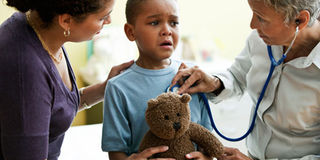Home care for children with sickle cell disease

Call your doctor right away or take your child to the hospital if your child has a fever of 101°F (38.3°C) because fevers are usually a sign of a more serious complication.
What you need to know:
- Uganda will tomorrow join the world to commemorate World Sickle Cell Day under the theme, “Break the silence, let’s care”.
- As we mark the day, it is important to note that sickle cell testing can make a difference in your life and that of your loved one.
Being in and out of hospital is one of the worst experiences parents of children with sickle cell suffer. However, parents should never tire from being in hospital because any slight laziness can lead to death.
This is the routine for such mothers according to Evelyn Mwesigwa, the programme officer for Sickle Cell at Central Public Health Laboratories (CPHL). She believes that parents are the first doctors in treating children with the disease.
Home care
Mwesigwa says the child’s blood cells transport oxygen and nutrients to all body parts but they are damaged due to sickle cell. They start breaking up and each time they do, they stop performing and become blocked. She adds, “When they are blocked in a particular place, it causes obstruction. The obstruction is what causes the pain. Do not be harsh to the child ordering them to keep quiet or go to sleep.”
Dr Philip Kasirye, the head of sickle cell clinic at Mulago National Referral Hospital, says infections appear because there is change in weather and malaria or anaemia. If the pain does not disappear two hours after giving a pain killer and water, rush the child to hospital. “The children usually become resistant to some pain killers so they keep getting to stronger pain killers. The best pain killer at home is water,” he says.
Dr kasirye adds that giving a pain killer is recommended during the crises but many parents do not know when and how to administer them. They give painkillers to children when they have not eaten which aggravates the pain, burns up the intestines and in the long run develop ulcers.
He adds that sometimes the pain affects very vital parts of the body. If the child has chest pain for instance, it could be that there is an obstruction in one of the organs in the chest. Any delays at home can lead to failure in breathing and death.
Signs to watch
“If a child has a high temperature, body weakness, chronic headache, blurred vision in one or both eyes or pain in the private parts especially for the boys, you must seek medical attention immediately,” Dr Kasirye warns. It is advisable to teach your child with sickle cell about basic care. This will help them live independently and lead a normal life.
Mwesigwa says, “Let them know which medicine they take, their prescription and also learn to avoid situations that trigger the crises.”
Screening centres
There is free sickle cell screening at CPHL in Butabika and various treatment centres in the country including; Mulago, Kasana health centre IV, Nsambya, Naguru, Mbuya, Iganga, Jinja, Kamuli, Namwendwa, Atur, Soroti, Lacor, Masaka and many others.
Screen before marriage
Screening for sickle cell takes a few minutes and is done in every hospital according to Dr Kasirye. After screening, one knows their status and this helps them to make informed choices about their marriage partners.
“It is therefore not advisable for people with a sickle cell trait to marry a carrier of the sickle cell gene because of there is a 50 per cent chance of having a baby with the disease in each pregnancy. However, a sickle cell patient (SS) can marry an individual with no trait of the disease (AA), as their offspring will only be carriers of the sickle cell genes and will not suffer the pain episodes experienced by sicklers.”
He adds, “It is important that partners take informed decisions after taking the tests to reduce the amount of suffering their children will go through especially for the sickle cell disease and save the amount of money and time they are bound to spend in treating children with sickle cell.”
If you are married already, test the children too so that they grow up knowing their status and make the right choices in their relationships.
Prevalence
Dr Philip Kasirye, the head of sickle cell clinic at Mulago National Referral Hospital, says A total of 49 of the 112 districts have a sickle cell trait that is greater than 15 per cent. Some districts have the trait greater than 20 per cent and they include Bundibugyo, Bulisa, Alebtong, Bugiri, Namutumba, Namayingo, Luuka and Kamuli.
Kampala, Gulu, Lira, Jinja, Tororo, Luweero, Wakiso, Apac, Buikwe, Mayuge, Iganga, Oyam Soroti and Masaka are highly burdened with 47 per cent prevalence and people from such areas should get screening.




